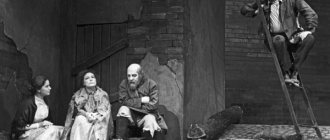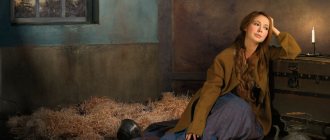The main characters of "At the Bottom"
Among the central characters who act in the play, Gorky highlights, in particular:
- Mikhail Kostylev
is a 54-year-old man who runs a rooming house. - Vasilisa
, Mikhail’s wife, who also cheated on her husband with Vaska Ash; 26 year old girl. - Natasha
, Vasilisa’s 20-year-old sister, who often suffered beatings from her; one day, when Vasilisa once again beat Natasha, she ended up in a hospital ward; The reader says goodbye to Natasha when, after the hospital, the heroine disappears - no one knows where. - Vaska Pepla
- a 28-year-old young man who made a living as a theft; one day Vaska thinks about life, striving to change for the better; the guy's mother gave birth to a son in prison; Vaska sincerely wants to become Natasha’s husband, to get rid of Vasilisa’s pressure, because the wife of the owner of the shelter wanted Ash to kill her husband. - Luka
- a 60-year-old traveler who preaches lies for the greater good (as Gorky says, Luka is an adherent of “comforting lies”); the hero talks little about himself. - Andrei Mitrich Kleshch
is the embodiment of the image of a “working man”; this is a 40-year-old man working as a mechanic who dreams of one day returning to the normal life he once led; Having lost his job, Klesh ends up in a shelter; perhaps Andrei Mitrich is the only character in the play who did not accept the circumstances of life; the man believes that after the death of his wife he will escape from the shelter and return to his former life; The tick does not believe that he has a place among the other inhabitants of the house; - Bubnov
is a 45-year-old cap wearer; the man is convinced that not a single person on this planet is capable of having his own place; Bubnov does not hide the fact that he loves gambling and alcohol; ends up in a shelter after his wife cheats, so as not to commit a “sin”. - The Baron
is a 33-year-old man who once led the life of an aristocrat; a former nobleman, the Baron said goodbye to his former life; Now the man lives with Nastya. - Satin
- a 40-year-old resident of a rooming house; the main idea that Satin “professes” is the conviction of the need for spiritual freedom for every person; in the “past”, normal life, Satin was a telegraph operator; Once Satin defended his sister’s honor, but killed a man in the process: for this offense the man was sent to prison, where he spent almost 5 years. - The actor
is an image that embodies the unbridled life of creative bohemia; The actor abuses alcohol and adheres to a pessimistic worldview, believing that life cannot be changed; as a result, the Actor takes his own life; Actor's pseudonym is Sverchkov-Zavolzhsky; the character’s current life is immersed in memories of the past, of the lofty; An actor is a hero with a subtle mental organization; the reader also knows that the Actor has lost his name and reputation.
This list demonstrates the central characters of the work of Maxim Gorky.
History of creation
It is interesting to take a brief look at the fate of the play itself. The work immediately found its recognition. Already six months after publication, the premiere took place on stage. An interesting fact is that the name has changed more than once. Previously, the author gave the following names to the play: “Nochlezhka”, “Without the Sun”.
The writer was able to convey so clearly, in detail and understandably the main experiences of unfortunate people who are far from the life of gentlemen and nobles. Just 3 descriptions of life in the play “At the Bottom” reveal the worldviews of an entire segment of the population.
Table
To understand the difference in the understanding of truth by different heroes, consider the table “Three Truths (“At the Bottom”)”, built on quotes.
| Bubnov | Luke | Satin |
| “But I... I don’t know how to lie!” | “It’s true, it’s not always because of a person’s illness... you can’t always cure a soul with the truth.” | “Man – that’s the truth!” |
| “In my opinion, leave the whole truth as it is! Why be ashamed? | “To love – you need to live... alive” | “Lies are the religion of slaves and masters! Truth is the god of a free man!” |
| “It’s never harmful to caress a person” | "Human! It's great! That sounds… proud!” | |
| ... you need to feel sorry for people! ... it’s time to feel sorry for a person ... it happens well!..” | “We must respect a person! Don’t feel sorry... don’t humiliate him with pity... you have to respect him!” | |
| “That is why every person must be respected” |
This article, which will help you write the essay “Three truths in the play “At the Bottom” by Gorky,” will consider the thoughts of Bubnov, Luka and Satin about truth and lies in human life.
Quotes from Bubnov About Man
Quotes from the play “At the Lower Depths”, 1902 (author Maxim Gorky)
- The noise of death is not a hindrance. (Bubnov)
- (with pride) My body is poisoned by alcohol. (Actor)
- I'm tired, brother, of all human words. All our words are boring! I heard every one of them. probably a thousand times. (Satin)
- It turns out that on the outside, no matter how you paint yourself, everything will be erased. everything will be erased, yes! (Bubnov)
- Education is nonsense, the main thing is talent. (Actor)
- And talent is faith in yourself, in your strength. (Actor)
- Can kindness of heart be compared with money? Kindness is above all blessings. And your debt to me is indeed a debt! So, you must reimburse me for it. Your kindness to me, an old man, must be shown free of charge. (Kostylev)
- There are no better people in the world than thieves! (Satin)
- Make the work pleasant for me - maybe I will work. Yes! May be! When work is pleasure, life is good! When work is a duty, life is slavery! (Satin)
- Where are they - honor, conscience? You can't put either honor or conscience on your feet instead of boots. Those who have power and strength need honor and conscience. (Ash)
- What is conscience for? I'm not rich. (Bubnov)
- What kind of people are they? Ragged, golden company. (Mite)
- And whoever is drunk and smart has two lands in him. (Bubnov)
- . Every person wants his neighbor to have a conscience, but, you see, it’s not beneficial for anyone to have one. (Ash)
- I respect swindlers too, in my opinion, not a single flea is bad: all are black, all jump. so that. (Luke)
- . Where it’s warm, there’s homeland. (Luke)
- It’s not enough to know, you understand. (Natasha)
- No matter how you pretend, no matter how you wobble, if you were born a man, you will die a man. And everything, I see, people are becoming smarter, more and more interesting. and even though they live worse, they want everything better. stubborn! (Luke)
- We are all wanderers on earth. (Luke)
- Nobility is like smallpox. and the person will recover, but the signs remain. (Luke)
- A pimple won't pop up without a reason. (Luke)
- All people on earth are superfluous. (Bubnov)
- He [a person] - whatever he is - is always worth his price. (Luke)
- I drank my soul away, old man. I, brother, died. Why did he die? I had no faith. (Actor)
- Everyone (. ) endures. Everyone endures life in their own way. (Luke)
- What good is it if you forgot what you love? The beloved has all the soul. (Luke)
- Man can do anything. if only he wanted to. (Luke)
- Death—it calms everything. she is affectionate to us. (Luke)
- . If someone has not done good to someone, he has done something bad. (Luke)
- And what do you really, really need? think about it! She really might be a bitch for you. (Luke)
- Ash:
.
God exists? Luke:
If you believe, it is; If you don’t believe it, no. What you believe in is what it is. - People still live. like wood chips floating down a river. building a house. and the chips - away. (Bubnov)
- Look - what am I? Bald. Why? From these very different women. (Luke)
- A woman must have a soul. (Ash)
- Man lives in different ways. as the heart is adjusted, so it lives. today - good, tomorrow - evil. (Luke)
- You need to love the living. alive. (Luke)
- You can't go anywhere in the carriage of the past. (Satin)
- I've always despised people who care too much about being well-fed (Satin)
- Man - that's the truth! Everything is in man, everything is for man! Only man exists, everything else is the work of his hands and his brain! Human! It's great! It sounds. proudly! (Satin)
- Illness is afraid of words, but death is not. (Bubnov)
- Girl, someone needs to be kind. You have to feel sorry for people! Christ felt sorry for everyone and commanded us to do so. (Luke)
- We must respect the person! Don't regret it. Don't humiliate him with pity. must be respected. (Satin)
- Lies are the religion of slaves and masters... Truth is the god of a free man! (Satin)
Hero's past
The Baron's ancestors were wealthy nobles. The family was famous during the times of Catherine and Nicholas. My grandfather held high positions. The estate consisted of hundreds of serf servants. Dozens of lackeys walked around the “golden boy”. Waking up in the morning, lying in bed, drinking coffee with cream. Amazing time! The Baron recalls those days with regret. The rest of your destiny can be built in stages:
- He studied at the noble institute. He just doesn’t remember what he studied.
- He served as an official in the noble chamber.
- Got married.
- Broke.
- Got caught wasting government money.
- He was fired and sent to prison.
- I found myself among the guests of the shelter.
What caused such a rapid decline in social status? Laziness, lack of independence, habit of living off the labor of others. Another reason is disrespect for the work of ancestors. The young man does not know how capital was created. He hopes that everything will go by itself, but what has been acquired by many generations passes through his fingers and disappears into the past. My whole life in wealth passed like a dream. The days in the shelter go by more slowly.
The main idea of the work
The structure of the play is conventionally divided into several episodes from the existence of people:
- Truth of fact (Bubnov).
- The truth of consolation and lies (Luke).
- Truth of faith (Satin).
The first story depicts a man who is disillusioned with this life. How else? Bubnov once had everything thanks to his own establishment. It was a controversial job that brought in a good income. But only his wife was considered the official owner. When his wife's betrayal is revealed, the baron leaves and is left with nothing. This is where Bubnov’s truth comes from in the play “At the Bottom”: you can’t trust anyone, everyone goes only to their own goal, everyone has the same end - death, which means there is no point in lying.
Story number 2 is completely opposite to Bubnov’s thoughts. Luke, who carries another idea of the work, believes in God. He teaches pity, love for all people, and shows compassion for others. Its main purpose in this life is to help in a difficult situation, to give hope for the best. Luka tries to find an approach to everyone:
- confidence in peace after death for Anna;
- a successful Siberian life for Vaska Pepel;
- a hospital where they treat alcohol addiction free of charge for the Actor.
Often, all of Luke's soothing speeches are lies. But the hero of this episode is sure that this solution is better than inflicting pain with the truth.
The third story is perhaps the key one in the whole work. Gorky is trying to convey his own point of view through Satin. Believing in yourself - this thought should be embedded in every person . If people know that they can achieve everything they want, their desires will definitely come true. Satin is not afraid to hurt others with harsh words. He will not “evade” and look for suitable phrases.
You should never wait for support from an outsider. No one will take care of you, you only need to rely on yourself.
The meaning of the character
The Baron is the roommate of the kind girl from Nastya’s basement. The girl is engaged in prostitution, but enthusiastically reads books, inventing true love for herself, hoping for true feelings. A noble ancestor laughs at a woman, calls her a fool or a fool. He seems to like to mock, anger and offend the woman close to him. The Baron explains his attitude:
“... I’m no match for you!... You’re scum...”
Only someone with an empty soul, evil and heartless, can do this.
The Baron humiliates Nastya in front of all the guests of the basement. The girl compares him to a worm eating an apple (her) and calls him unhappy. The author helps to understand how a kind but poor person can turn out to be higher and purer in soul than the “decayed” nobles.
The character's conscience is also lost. Laughing at the woman’s hobby, he asks her for money for wine. He is not ashamed to take advantage of others, showing disdain for them. The man goes to make peace
“...if you don’t make peace, you won’t let me buy you a drink...”
If another, richer one appeared in the shelter, the Baron would immediately defect to her. There is no affection or devotion in him. Although in some scenes it seems that there is still some kind of affection.
Luke
Luke believes that lying can give a person hope. The hero adheres to the position of white lies. Luke tells the drunken actor about a special city in which he will recover from alcoholism and change for the better. Luke tells the dying Anna that after death she will find real peace. Luka tells Nastya, who was striving to find love, that she will definitely achieve what she believes in. The hero who appears in the shelter tries to support everyone who is at the “bottom”. Luke's truth is mercy and compassion. It is built on love for all humanity. The hero strives to give every resident of the shelter hope for a better life, and lies become a weapon. Luka does not agree with Bubnov’s position; he believes that truth alone cannot cure a person’s soul.
Character
The Baron forgot not only his first and last name, he lost everything he had been taught. The nickname remains, reminiscent of the character’s exalted origins. There are no refined manners or cultural skills. The lordly manners remained. The man is only 33 years old, but it seems that he is an old man tormented by fate. The former nobleman says his life is funny. Satin does not agree, there is no joy in fate, there is a lot of stupidity. What characteristics do the guests of the Kostylevo basement give to the hero:
- Lost Soul;
- Empty man.
The baron is almost accustomed to poverty, but sometimes the “master” breaks through. A man wants to learn something. He plays cards, tries to cheat, but he is quickly discovered. Tricks are not easy for the Baron, and education does not help either. Spoiled as a child, the Baron remains arrogant and arrogant.





